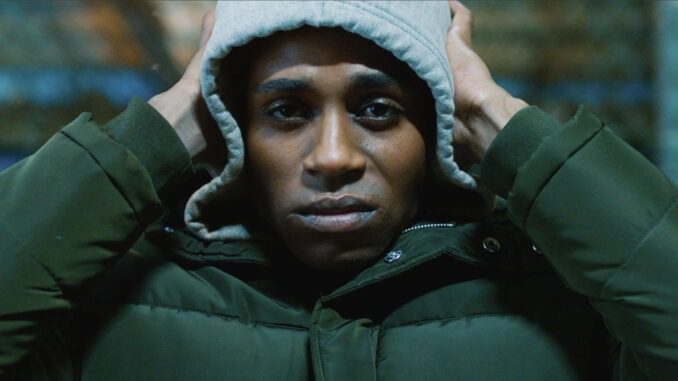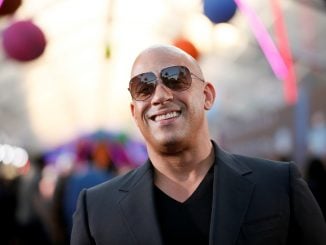
While blockbuster movies spend hundreds of millions of dollars to tell stories of comic book superheroes, many of the world’s best filmmakers are stretching budgets of a few thousand dollars to try to bring huge ideas to the screen. In an ongoing series, we will look at some of the top candidates for this year’s Academy Award in Best Short Film. Directors and producers from Italy to New York, Ireland to China are tackling some of humankind’s biggest issues on a shoestring. In our first installment, we look at New York filmmaker Doug Roland’s journey into the life of a DeafBlind man trying to make his way in the big city: FEELING THROUGH.
It’s not unusual to see a man holding a sign on a New York City street corner. What caught Doug Roland’s attention 10 years ago was what the sign said, and it just might lead him to filmmaking’s highest honor.
“It said, ‘I’m deaf and blind and need help crossing the street,’” Roland recalled.
In FEELING THROUGH, Roland’s fictionalized account of that encounter a decade ago, the man stands, seemingly unaware of just how impossible his predicament seems to be. As cars speed by, inches away, he waits patiently, content in his trust that help would arrive.
In real life, Roland approached the man.
“I tapped him,” he recalled. “He pulled out a notepad and wrote that he needed a bus stop. When I took him over there, a bus wasn’t coming for over an hour, and I wanted to sit and wait with him. So I just kind of instinctively took his hand and started tracing one letter at a time on his palm. And he understood it, and we ended up having a whole conversation that way–with him writing in his notepad me tracing letters on his palm.”
Roland, a filmmaker whose short film JADE is up to more than 23 million views on YouTube and feature LIFE HACK won 16 festival awards, decided to put his experience that New York night to film. The result is a tense, fraught tale of a DeafBlind man’s journey home and the life-changing impact it had on the man who reluctantly chose to help him.
“This 18 minutes is probably the best 18 minutes I’ve ever spent watching a film,” said Marlee Matlin, the first deaf actress to win an Oscar. After seeing the film, she immediately signed on as an executive produer. “I know for myself. If and when I get excited about a project, then, I know that it really is unique and this certainly stands there as a unique project. It is a testimony to a story that has to be told. It’s at the same time, a very simple story, and has so many levels, it’s so deep It’s so lovely and natural/ It’s authentic and that’s the word that we really want to focus on. It’s authentic.”
Roland made movie history by casting the first DeafBlind actor in a starring role. He worked with Helen Keller Services to cast interested aspiring actors both in person and remotely, but he didn’t find his leading man, Robert Tarango, until fate intervened.
“Robert, at the time, was working in the kitchen at Helen Keller National Center,” Roland said. “He was not on our casting list that day.”
During a break, when it was evident Roland hadn’t found what he was looking for, one of the sign language interpreters approached with an idea.
“Hey,” he said. “what about what about Robert?”
“So Robert was pulled out of the kitchen, not really fully explained as to what was happening. I think initially thought he might be in trouble,” Roland recalled.
“I didn’t really know what was going on,” Tarango said. “I was just doing my job in the kitchen, and my supervisor called me out and said, ‘Come with me.’”
Tarango was born deaf, the result of a rare genetic disorder called Usher Syndrome, which also causes progressive vision loss. About half of the 2.4 million DeafBlind people in America have the syndrome.
Tarango began losing his vision in his 20s and is now legally blind, his vision limited to a small pinhole.
“The more they started explaining, the more inspired and the more excited I got,” he said. “I started to say to them, ‘Are you serious? You really think that I could be in a movie?’ Growing up, I had wanted to be an actor for a very long time, but I’m thinking that I was deaf. I couldn’t be an actor, and then especially losing my vision, I really couldn’t be an actor.”
The man who comes to Tarango’s aid in the film is Tereek, a young African-American looking for a friend to crash with that night. At one point, he has to decide whether to make sure the DeafBlind man gets home safely or get to a lady friend’s apartment before she falls asleep.
Steven Prescod brings the character of Tereek to life with a vulnerability that keeps his allegiance to his newfound companion in doubt throughout the film.
Prescod’s journey to FEELING THROUGH is as improbable as Tarango’s. Sent to Riker’s Island at 16 for robbery, he was given a second chance by a judge and found a performing arts program that he says “saved my life.” At age 22, he gave a spoken-word autobiographical performance to Prince William on the future king’s visit to New York. The Prince was so moved by what he called an “inspirational” performance that Prescod has his number in his phone.
Prescod is able to bring Tereek’s moral struggle to a level on par with Tarango’s physical one as the two attempt to navigate late-night New York City, including a trip to a bodega and an encounter with a rude bus driver.
The result is a heartfelt statement movie that has the ability to inspire no matter which character the audience tracks.
“One shouldn’t feel afraid to be creative,” Matlin said. “To be able to write your own story write your own script. But at the end of the day, we shouldn’t be able to think about actors wearing disability like in costume but to do authentic representation. We should let them be able to tell their stories.”f




